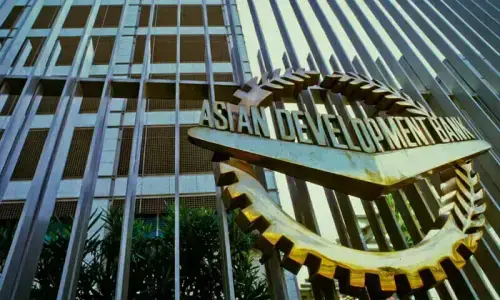With Indian troops amassed along the Pakistani border in early 1987, the morning of Feb 21, 1987, presented an altogether different surprise: a Pakistan Air Force jet landed at Delhi airport, with the visitor none other than Pakistan President General Ziaul Haq.
The general had flown to Delhi on the pretext of watching a test match between Pakistan and India in Jaipur, with his arrival putting Indian Prime Minister Rajiv Gandhi in a spot of bother. In an article published by India Today, Behramnam, special adviser to Rajiv Gandhi, claimed that the Indian prime minister was not prepared to receive the General at the airport but had to be convinced by his associates to do so. With the match being played in Jaipur, Behramnam was deputed by Rajiv to accompany Gen Zia and tend to him.
As quoted in the India Today article, Behramnam states: “Before departure for Chennai, General Ziaul Haq, while saying goodbye to Gandhi said, ‘Mr Rajiv, you want to attack Pakistan, do it. But keep in mind that this world will forget Halaku Khan and Changez Khan and will remember only Ziaul Haq and Rajiv Gandhi, because this will not be a conventional war but a nuclear war. In this situation, Pakistan might be completely destroyed, but Muslims will still be there in the world; but with the destruction of India, Hinduism will vanish from the face of this earth.’”
Gen Zia had left Rajiv shaken.
Gen Zia’s unannounced arrival in New Delhi paves the way for peace, but only after another threat of absolute destruction in South Asia is delivered to PM Rajiv Gandhi
“These were only few minutes, but Gen Zia seemed to us a very dangerous man. With a stern-face, Gen Zia’s eyes showed that he meant business. I was astonished, that after this stern warning, in a flash, Gen Zia started smiling as if nothing happened and warmly shook hands with other hosts. Except Rajiv Gandhi and myself, [nobody knew] that Gen Zia had created problems for the Indian PM by threatening him with nuclear war,” said Behramnam.
Wisdom ultimately prevailed, and the next day, Rajiv met Gen Zia for dinner. They spoke briefly but with definite intention of reducing tensions at the border. They agreed that in the first phase, both countries would withdraw 80,000 troops from each side. To discuss the mechanics of further withdrawals, an Indian team would visit Pakistan and carry talks.
Why had the general decided to deliver his viewpoint to the Indian leadership directly?
It so happened that the US had warned Pakistan in 1984 that India was planning to attack its nuclear installations in a fashion similar to how the Israelis attacked Iraq’s Osiraq facility. This information was conveyed to Gen Zia in a confidential letter written by President Ronald Reagan on Sept 12, 1984, delivered by Ambassador Hinton, US ambassador to Islamabad.
Details about this exchange were disclosed in the recently declassified US State Department documents. Both the “Talking points for use in delivering letter to General Zia” (a four-page undated secret document) and President Reagan’s letter to General Zia (a three-page secret and sensitive document) were only revealed recently; neither had been revealed or published before.
Reagan’s fear was based on a CIA analysis, which noted in July 1984 that some sections of the Indian government viewed a Pakistani nuclear threat as imminent. The CIA analysis also noted that “an Indian attack on Pakistani nuclear facilities would almost certainly prompt retaliatory strikes against Indian nuclear facilities and probably lead to a full scale war.” The US also wanted Pakistan to restrict its uranium enrichment to a maximum of five per cent, a breach of which would trigger sanctions on Pakistan.
In reply to Reagan’s letter of November 7, 1984, Gen Zia did not mention Reagan’s request to limit uranium enrichment. Instead, he flatly denied Pakistan having uranium enrichment capability. “Pakistan has no intention whatsoever to manufacture or detonate a nuclear device,” the general told the American president.
Meanwhile, off the cricket field, Gen Zia told media personnel, “Cricket for peace is my mission, and I have come with that spirit.”
By March 1987, tensions between the two countries had diminished appreciably. They reached an agreement to withdraw 150,000 troops in Kashmir followed by withdrawal of more troops from Rajashthan desert. India stuck to its decision of holding military exercises, telling Pakistan that it had nothing to worry about. India delayed the last phase of the exercise to communicate the same message.
In the context of Pakistan and India, cricket diplomacy has a special place. After Gen Zia’s visit, General Pervez Musharraf also visited India on the pretext of watching a cricket match, and ultimately led to more dialogue and better friendly ties between the two neighbouring countries. In 2011, after democracy returned to Pakistan, Indian Prime Minister Manmohan Singh invited his Pakistani counterpart to visit India and witness a cricket match between the two countries. PM Yousuf Raza Gilani accepted the invite, and went to Mohali which helped defuse tense situation between the two countries after the 2008 Mumbai attacks.
Published in Dawn, Sunday Magazine, November 15th, 2015































